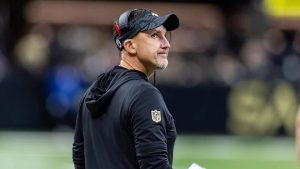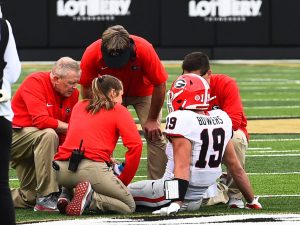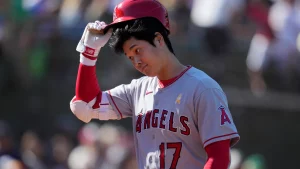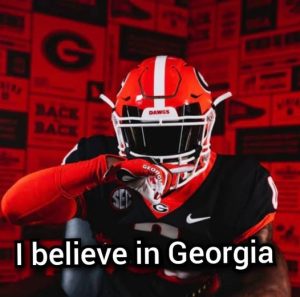
Leroy Rosenior: ‘I always encouraged Liam to go for his dreams. I’m so pleased he is’

Leroy Rosenior enjoys telling a story from 20 years ago and a time he was manager of Torquay United. The pressures of a promotion race were mounting in Division Three (now League Two) and the decision was made to go with experience for the visit of fellow hopefuls Yeovil Town.
That meant there was no place in the team for one 19-year-old rookie borrowed from Premier League club Fulham: his son, Liam.
“We were living together in Exeter and I used to take Liam into training,” Leroy tells The Athletic. “We drove all the way in on that day and then I got Alex Russell, who was one of the midfielders at Torquay, to bring Liam to my office. I dropped him and Liam said: ‘Why didn’t you just tell me that on the drive in?’.
“When I signed him I told him I’d treat him the same as the other players and that’s what I was doing. It wasn’t so much for him — it was for the rest of the group, to let them know there were no favourites.”
Then the punchline.
“We were 2-0 down (against Yeovil) after 20 minutes so I brought Liam on and we drew 2-2,” he laughs. “It was clearly a mistake on my part.”
A month later, the father and son would celebrate as automatic promotion winners, Torquay finishing third on goal difference thanks to a 2-1 victory away at Southend United on the season’s final weekend. That day stands as Leroy Rosenior’s greatest as a manager, but there are justifiable hopes that Liam is gearing up for bigger.
A first full season in charge of Hull City has seen the young Rosenior included on a shortlist of three for the Championship’s manager of the season at the EFL’s annual awards to be held in London on Sunday evening.
The play-off finish he has spent the season chasing has begun to look improbable after falling six points adrift of Norwich City, albeit with a game in hand. But Rosenior, at 39, has held his own in a division that has a habit of consuming novices.
The making of the manager has been a long process. Liam’s formative years were spent shadowing Leroy, a talented forward with Fulham, Queens Park Rangers, West Ham United and Bristol City — where Liam and brother Darren were once mascots on the day their father scored a hat-trick — and then playing under him at Torquay.

Leroy Rosenior competes with Derby County’s Ted McMinn during his playing days at West Ham United (John Giles/PA Images via Getty Images)
“It was just normal life to Liam, but he soaked it up,” says Leroy, now 59. “I developed as a player by talking about the game all the time and Liam would always be there listening in.
“I knew he’d always try (to be a manager). I know all the work he’s done over the last few years, how he sees the game and what he wants to be as a coach. He writes so much down; that book is almost like a bible to him.
“There was never any doubt he was going to have a go. I’ve always encouraged him just to go for his dreams. I’m so pleased he’s doing it.”
And doing it well. A playing career that included more than 100 games in the Premier League as a full-back with Fulham, Reading, Hull and Brighton & Hove Albion brought no shortage of highlights, including two promotions from the Championship and an appearance in the 2014 FA Cup final, but Liam has long considered management his more natural calling.
Time was spent coaching teams when still at school, before spells at Hull and Brighton with afternoons and evenings given up to take sessions at the club’s academy. Studying for his UEFA Pro Licence coaching badge also began long before his retirement as a player in 2018.

Liam Rosenior, then with Fulham, battles with Manchester United’s Alan Smith in 2004 (John Peters/Manchester United via Getty Images)
Liam has likened the relationship with his father to that of Nigel and Brian Clough, watching and observing the skills and challenges of management for much of his formative years.
“He honestly wanted to be a manager before he wanted to be a player,” says Leroy. “He enjoys it so much. I can remember when he was two and we were a little bit worried about him so we had an educational psychologist come and do some work with him.
“We found out then that he could read and we didn’t know it. He’d get the papers through the letterbox every morning and he was teaching himself to read when he was two and three years old. We wanted a normal environment socially around his brother, but I’d say he thinks differently to some people. Let’s put it that way.
“From a very young age, he was always inquisitive and self-motivated. We’d be talking about football, even when he was a young boy. About how we’d improve as individuals, and he was there listening. He’s always wanted to delve deeper.”
Liam is not shy in saying his father has long been his role model in life. The pair still speak most days.
“I used to say to him, ‘Details are important’,” says Leroy. “That’s what makes the massive difference in football.
“People always ask me if I’m giving advice, but if Liam wants me I’ll let him ring me. I don’t want to get in his way. This is his job and he needs to do it his way. My opinion is always there if he wants it, but he’s his own man.
“I’ve told Liam that a lot of managers are prisoners of their own experiences and, in my day, I’d do it this way. But the game is progressing so much every single day. He’s in a space, a lot younger than me, where he can pick things up and progress. Football is developing so quickly and he’s across that.”

Liam Rosenior barks instructions from the touchline as his team are beaten at Leeds (Danny Lawson/PA Images via Getty Images)
There is disappointment around Hull, accepted by their head coach after a 2-2 draw with Middlesbrough on Wednesday night, that this season is not ending with greater momentum. Saturday’s 3-1 win away to Cardiff is the only victory in eight games, a damaging run preceded by five wins in six. With games running out, the subsequent fall from sixth to 10th has been ill-timed.
Few, though, gave Hull much hope of a sustained promotion challenge this season — not after last term brought relegation fears before their eventual finish of 15th. It is why Rosenior has been shortlisted alongside Daniel Farke of Leeds United and Ipswich Town’s Kieran McKenna in the running for the Championship’s Manager of the Season.
GO DEEPER
Football’s best up-and-coming managers: Kieran McKenna
Rosenior’s fledgling managerial career is on an upward trajectory following an interim spell in charge of Derby County last season, an experience that preceded his appointment as Hull’s boss in November 2022. A new three-year contract, signed before Christmas, was another endorsement of his progress.
“It’s understanding the game but also, within that, understanding people,” says Leroy. “Liam understands people very well. He’s a good communicator, too. That helps him get ideas across. I would say this but he’s likeable, too. Once you meet Liam, he’ll try to do the best for you. He does his best for everyone and that’s a good trait to have.”
A return to East Yorkshire, where Liam was a player for the club his late grandmother supported between 2010 and 2015, has served all parties well. Owner Acun Ilicali, a Turkish businessman, has called his manager a “very special person” and, on the surface, the relationship is tight.
“I had a lot of conversations with Liam and just told him that the right job would come,” says Leroy. “There were some opportunities that didn’t quite happen, but I told him he’d know when the right one did present itself. He knew the club as a player with Hull, the fans knew him, and the people there said they’d let him get on with the job.
“It’s been great.”

Ilicali, the Hull City owner, shares a joke with Liam Rosenior (Richard Sellers/PA Images via Getty Images)
There was one moment in the season that Liam Rosenior said left a “bitter taste”.
No sooner had Hull’s head coach been shortlisted by the EFL for individual honours at the end of last month than his daughter was discovering the racist abuse aimed at her father on social media.
Liam chose to make the incident public last week in an interview with BBC Radio Humberside. His employers condemned the abuse that came via an anonymous account on X and confirmed it had been reported to Humberside Police.
It is not the first time the Rosenior family has encountered racism through football. Leroy wrote about the abuse he received as a player at length in his autobiography, It’s Only Banter, detailing how he asked his sisters not to attend any more games such was the vitriol aimed his way.
Leroy has devoted much of his adult life to tackling racism in football and still works as an ambassador for the campaigning group Show Racism the Red Card. He was awarded an MBE in 2018 for his services to tackling discrimination in sport.
“The first thing you’ve got to do when these things happen is call it out, so I’m proud of the way Liam handled it,” he says.
“You need to let people know why it’s unacceptable. That sounds ridiculous but a lot of people out there don’t recognise that. When you’re not on social media and your daughter comes up to you to say someone has called you this on social media, can you imagine the impact that has on your family and the people around you?
“What he did was absolutely right because, if you ignore something, then you condone it. The person who’s done it will think they’ve got away with it and will go and do it to someone else.

Leroy Rosenior during his stint as Torquay United manager in 2004 (John Walton/EMPICS via Getty Images)
“You have to make people think about different situations. How it impacts not only you but others. I’m sure Liam can handle it but it’s about everyone around him. They shouldn’t have to deal with that or see it. He thinks about things very carefully and how he words things.
“As a football manager, you do have to be a politician at times. Every word matters, so I was really pleased with how he handled it. I wouldn’t have expected him to just forget about it and pretend it didn’t happen because his children can’t do that.”
Liam had the backing of Hull’s supporters in the first game after the incident and held up a “Say No to Racism” banner that one fan had taken to the 3-1 win over Cardiff City last weekend. Leroy had made the journey from his home in Bristol to show his support and had a kiss blown his way after the full-time whistle.
“People will say I experienced far worse but, to the person experiencing it, it’s the same,” says Leroy. “It’s just as traumatic. When people were calling me names from the terraces, spitting at me or whatever, I could see their faces in front of me.
“I could see who it was and what they were doing. It was usually when I was playing well. It was really unpleasant but I’d find it just as difficult with social media. I couldn’t see them.
“They’re invisible to you. You don’t know where they are or where they’re coming from. Somebody, within seconds, can racially abuse you. It wasn’t worse in my time, it was just different. We still have to be very aware, even though you don’t really have people saying things on the terraces anymore.
“Society has moved forward. The people who were against these things are hopefully more in a minority but they’re still there. Sometimes they’re the ones shouting the loudest.”






